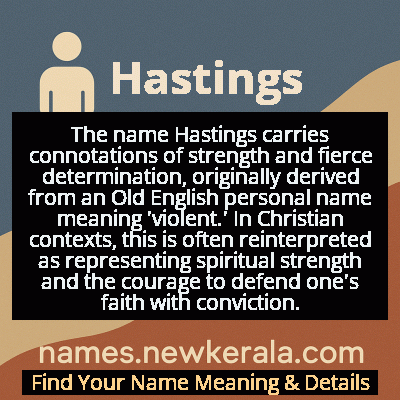Hastings Name Meaning & Details
Origin, Popularity, Numerology Analysis & Name Meaning of Hastings
Discover the origin, meaning, and cultural significance of the name HASTINGS. Delve into its historical roots and explore the lasting impact it has had on communities and traditions.
Name
Hastings
Gender
Male
Origin
Christian
Lucky Number
7
Meaning of the Name - Hastings
The name Hastings carries connotations of strength and fierce determination, originally derived from an Old English personal name meaning 'violent.' In Christian contexts, this is often reinterpreted as representing spiritual strength and the courage to defend one's faith with conviction.
Hastings - Complete Numerology Analysis
Your Numerology Number
Based on Pythagorean Numerology System
Ruling Planet
Neptune (Ketu)
Positive Nature
Intuitive, analytical, spiritual, and inquisitive.
Negative Traits
Secretive, reserved, aloof, and can be overly critical.
Lucky Colours
Green, yellow.
Lucky Days
Monday.
Lucky Stones
Cat’s eye, moonstone.
Harmony Numbers
1, 5, 6.
Best Suited Professions
Scientists, researchers, spiritual leaders, detectives.
What People Like About You
Depth of knowledge, analytical skills, spirituality.
Famous People Named Hastings
Hastings Banda
Politician/Physician
First President of Malawi who led the country to independence from British rule
Hastings Ismay
Military Leader/Diplomat
Chief of Staff to Winston Churchill during WWII and first Secretary General of NATO
Hastings Kamuzu Banda
Physician/President
Led Malawi's independence movement and served as the nation's first president for 30 years
Hastings Rashdall
Theologian/Philosopher
Influential Anglican theologian and philosopher known for his work on moral theory
Name Variations & International Equivalents
Click on blue names to explore their detailed meanings. Gray names with will be available soon.
Cultural & Historical Significance
In Christian contexts, Hastings has been borne by notable religious figures who reinterpreted its originally violent meaning into spiritual strength and moral conviction. The name's association with both English history and African independence movements (particularly through Hastings Banda of Malawi) creates a unique cross-cultural significance. It represents both colonial history and post-colonial resistance, making it a name that bridges different historical narratives and cultural experiences while maintaining its core identity as a name of strength and leadership.
Extended Personality Analysis
Individuals named Hastings typically exhibit strong leadership qualities, determination, and a natural authority that commands respect from others. The name's historical associations with battle and conquest suggest personality traits such as strategic thinking, resilience in adversity, and the courage to pursue ambitious goals. Hastings tend to be principled individuals with deep convictions, often displaying intense passion for their beliefs and causes. While the name's original meaning of 'violent' might suggest aggression, in practice it more commonly manifests as fierce protectiveness, strong will, and unwavering commitment to what they value.
These individuals often possess a keen historical awareness and sense of legacy, feeling connected to the weight of their name's history. They are typically goal-oriented, persistent, and unafraid of challenges, with a capacity for both careful planning and decisive action. In social contexts, Hastings may come across as somewhat formal or traditional, but they also demonstrate loyalty and deep care for those in their inner circle. The combination of historical gravitas and personal intensity makes them natural leaders who inspire both admiration and respect, though they may need to balance their strong convictions with flexibility and openness to others' perspectives.
Modern Usage & Popularity
In contemporary naming practices, Hastings remains an uncommon but distinguished choice that appeals to parents seeking a name with historical depth and strong character. Its usage has seen a slight resurgence in recent years as part of the trend toward surname-names and historically significant appellations, though it remains outside the top 1000 names in most English-speaking countries. The name is particularly popular among families with British heritage or those interested in medieval history, as well as in African communities where it honors the legacy of Hastings Banda. Modern usage often treats Hastings as a sophisticated alternative to more common traditional names, offering a blend of historical weight and distinctive sound that sets it apart from more fashionable choices while maintaining timeless appeal.
Symbolic & Spiritual Meanings
Symbolically, Hastings represents the transformative power of conflict and the enduring nature of historical legacy. The name embodies the concept that significant change and progress often emerge from struggle and determination, carrying connotations of conquest not merely as domination but as fundamental transformation. In spiritual terms, the 'violent' aspect can be reinterpreted as righteous strength—the courage to confront injustice, protect the vulnerable, and wage spiritual warfare against negative forces. The name also symbolizes cultural synthesis and the complex layers of identity that develop when different traditions intersect, serving as a reminder that personal identity is often shaped by historical forces beyond individual control while still allowing for agency and reinterpretation.

